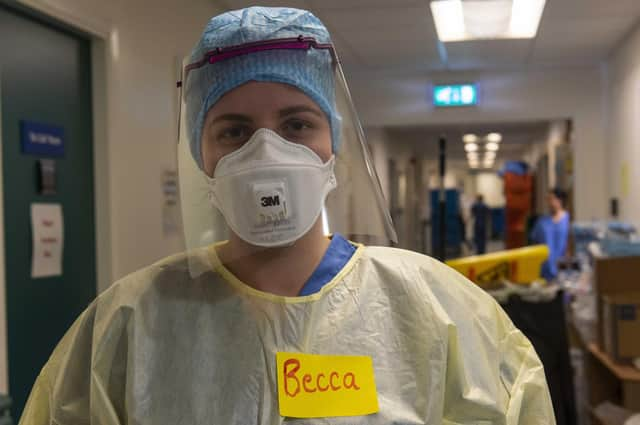NHS Lothian forecasts £119 million bill for Covid and warns of longer waiting times ahead


HEALTH bosses in Lothian expect to run up a Covid bill of £119 million by the end of the year.
NHS Lothian finance director Susan Goldsmith told MSPs the extra costs from coping with coronavirus included creating extra capacity, bringing in extra staff to cover for absences, recruiting more student nurses, enhanced cleaning and taking on extra porters.
Advertisement
Hide AdAdvertisement
Hide AdThe £119m total does not cover social care, but does include some estimated costs for getting services back up as the health service recovers from the crisis.
The Scottish Government has made extra funding available to help meet costs, but Ms Goldsmith said how the money is shared out was still under discussion between the government and health boards.
Giving evidence to the Scottish Parliament’s health committee, she said it was recognised the usual population-based formula was “not necessarily appropriate”.
“Some costs were driven by population size, like test and protect, but others were to do with the way in which Covid hit boards, where we’ve seen a greater impact in Lothian and Glasgow and less impact further north.”
Advertisement
Hide AdAdvertisement
Hide AdCalum Campbell, NHS Lothian interim chief executive, told the committee that Covid would mean longer waiting times for other treatment.
He said: “We didn’t have enough capacity to meet demand prior to the pandemic - that’s why we had waiting time challenges - and the pandemic has brought that into really sharp focus. There will be a significant backlog which will take us a significant amount of time to address and clear.
“We are going to have to be honest and say the waiting times will be a real challenge to get back to. It will take us a significant amount of time and the financial availability to support that, I would have thought, given the impact on the economy, is going to be limited.”
He was asked about hip and knee replacement operations. Mr Campbell said: “We were struggling before this with our capacity. We will have to see if we can work with the independent sector because, while not clinically urgent, the impact on somebody’s life of these things can be absolutely massive. We need to find a solution to it and I think it is going to come at increased cost.”
Advertisement
Hide AdAdvertisement
Hide AdMSPs also asked what new technologies used during the pandemic might be retained by the health service.
Mr Campbell said “Near Me” video consultations offered by GPs had “great potential” and could be used especially for patients in nursing homes.
“Remote monitoring can also reduce the need for patients to come to hospital.”
And he said the success of home-working by staff in HR, payroll and finance departments had been “a revelation”.
Advertisement
Hide AdAdvertisement
Hide AdHe said he expected the NHS would spend more on technology in the wake of the pandemic.
But he warned: “We have to be careful about digital exclusion. As we invest in the health service we have to be aware we don’t drive inequalities in a different way.”
A message from the Editor:
Thank you for reading this story on our website. While I have your attention, I also have an important request to make of you.
The dramatic events of 2020 are having a major impact on many of our advertisers - and consequently the revenue we receive. We are now more reliant than ever on you taking out a digital subscription to support our journalism.
Subscribe to the Edinburgh Evening News online and enjoy unlimited access to trusted, fact-checked news and sport from Edinburgh and the Lothians. Visit https://www.edinburghnews.scotsman.com/subscriptions now to sign up.
By supporting us, we are able to support you in providing trusted, fact-checked content for this website.
Joy Yates
Editorial Director
Comment Guidelines
National World encourages reader discussion on our stories. User feedback, insights and back-and-forth exchanges add a rich layer of context to reporting. Please review our Community Guidelines before commenting.